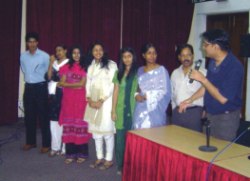Film
KRANTI
Here and Beyond:
Rubaiyat
Khan
 On
International Women's Day, The British Council hosted a screening
of 'Kranti-Here and Beyond', a 90 minute feature
film dedicated to women's rights and to promote social awareness.
Written and directed by Dr. Mirza Hassan, Consultant Researcher
working with Bangladesh Legal Aid and Services Trust (BLAST),
Kranti targets a mainstream audience. On
International Women's Day, The British Council hosted a screening
of 'Kranti-Here and Beyond', a 90 minute feature
film dedicated to women's rights and to promote social awareness.
Written and directed by Dr. Mirza Hassan, Consultant Researcher
working with Bangladesh Legal Aid and Services Trust (BLAST),
Kranti targets a mainstream audience.
Kranti presents the life of a rural community and
follows the activities of a female NGO worker, Rokea. The
story is centred on the protagonist Rokea, and three young
women in particular whose lives are positively affected by
her. Rokea is an educated woman, who through legal intervention
has set out to make a difference in the lives of women suppressed
by patriarchal norms. She runs the local branch of a legal
assistance outfit. Rokea is quick to defy tradition and social
prejudices against women, thereby igniting much opposition,
both overt as well as subtle. However, Rokea is not entirely
portrayed as a one-dimensional character. Though we see her
as an assertive figure and an agent of social change, she
is vulnerable to contradictions born out of her own emotional
baggage as a middle-class Bangali woman from a humble background.
(At one point in the film for instance, she commits a Freudian
slip by declaring that she too 'needed a husband'.)
Alekjan
is the first of three women who turns to Rokea for help. A
poor local village girl, Alekjan finds herself an unwed mother.
The man who seduced her, the father of her child, is merely
fined Taka 10,000 (spent on giving a feast) by the village
elders and absolved of all other responsibilities. Alekjan's
life on the other hand is ruined and she becomes an outcast.
Her only concern now is her honour, and bound by patriarchal
norms, she succumbs to the idea of marrying her seducer, if
only to give her unborn child its father's name.
Shiuli,
a naive village girl, is married off and sent to live 'happily
ever after' with her husband and in-laws. However, unable
to fulfill her dowry demands on time, she is sent back to
her parents. Shiluli's husband writes her letters and declares
that he loves her but he is portrayed as a weak and ineffectual
coward who cannot go against his parents' wishes.
Amina,
a fourteen-year-old, is raped, and Rokea and her team make
an effort in aiding her by undertaking legal action against
the perpetrator. The young girl is almost brutally interrogated
by a local police officer who asks her if she's been 'soiled'.
Shockingly enough in the end, the question of a woman's 'honour'
once again rears its ugly head and the traumatised Amina is
forced to marry her abuser.
Rokea's
own emotional turmoil, her anger and frustrations at her inability
to effectively help women like Amina are evident. However,
there is reason to be hopeful in the end. Shiuli at one point
realises the absurdity of her situation, and, in an act of
self-liberation, burns her husband's letter. Alekjan takes
a stand as well and one is allowed a glimpse of her staring
wistfully at a class full of school children, indicating her
desire to learn and to educate herself. Amina is the only
exception; she perfectly fits the profile of the abused woman,
one who can neither take a stand nor protest and therefore
continues to be abused.
Kranti
is a realistic portrayal of the issues that women face in
the contemporary world they inhabit. The word 'Kranti'
means transition or juncture and the film, though mainly concerned
with fault lines of patriarchy and restrictive norms, also
traces the subtle beginnings of a change of such norms. Kranti
therefore ends on a hopeful note with Rokea continuing her
quest to create these subtle changes and we are given the
impression that she and others like her, will tirelessly work
on changing the fabric of society, and in turn, help in reviving
the spirit of womanhood.
Copyright
(R) thedailystar.net 2005 |
